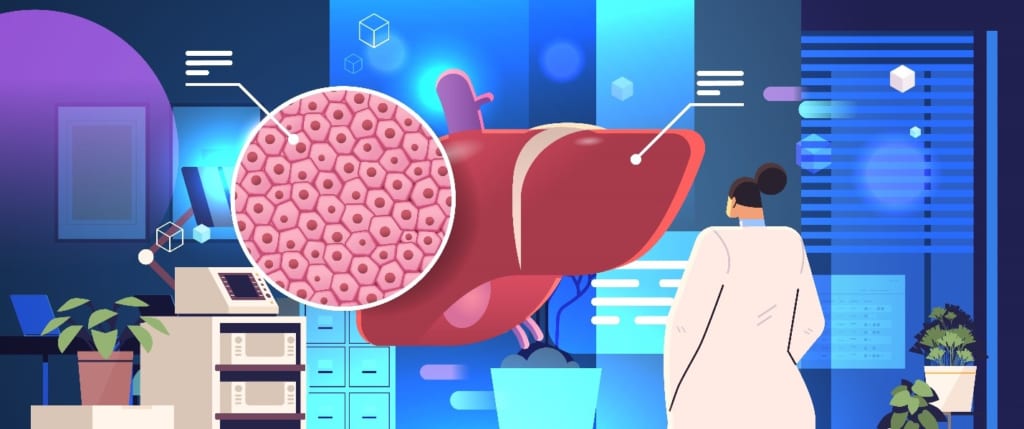
The HBsAg index plays a very important role in helping you determine whether you have hepatitis B, and from there, decide on the appropriate treatment method. So, what is the HBsAg index? What should you do after testing positive for HbsAg? Join Insmart to explore these useful contents in the article below.
1. Definition: What is HBsAg?
HBsAg, short for Hepatitis B surface antigen, is a surface antigen of the hepatitis B virus (HBV). It is one of the many antigens of the hepatitis B virus discovered by Blumberg in human serum.
The HBsAg test is one of the five basic categories of hepatitis B testing that helps determine the presence of the HBV virus in the blood. The results from the blood test will indicate whether the individual being tested is infected with hepatitis B. A positive HBsAg test means that the HBV virus is present in the patient’s blood. Conversely, a negative HBsAg result means the patient is not infected with the HBV virus. Typically, HBsAg will appear in the patient’s blood approximately 1 – 8 weeks after the body’s first contact with HBV.

2. What is the significance of the HbsAg test?
HBsAg test is an important screening tool that helps detect the hepatitis B virus in the blood. It is a type of screening test that determines whether you are infected with the hepatitis B virus. However, the HBsAg test results cannot assess the severity or infectious potential of the virus. To arrive at a more accurate conclusion, the patient needs to undergo a few additional tests, involded:
- – HBsAb test: evaluation of antibodies after hepatitis B vaccination.
- – HBeAg test: determination of antigen e to assess the active status of the hepatitis B virus.
- – HBeAb (Anti-HBe) test: evaluates antibodies against HbeAg.
- – HBcAb (Anti-HBc) test: tests for anti-core antibodies of the hepatitis B virus to evaluate chronic hepatitis B.
If the HBsAg test result is positive or shows a reaction, this indicates that the virus is present in the blood. At this point, there are two scenarios:
- – If the HBsAg index result is negative after 6 months, it means that our body has completely recovered and is immune to hepatitis B. However, this does not mean you can be entirely complacent; instead, you should get vaccinated to prevent the risk of infection.
- – After 6 months, if the HBsAg index result is still positive, there is a possibility of chronic hepatitis B infection. In this case, the patient needs long-term treatment to prevent liver damage and other dangerous complications.
In reality, only about 10 – 15% of people who test positive for HBsAg (+) fall into the category of chronic carriers. In most other cases, hepatitis B will resolve on its own, and anti-HBs will end the infection process without significant treatment. Among those with chronic hepatitis B, only a minority will progress to chronic hepatitis, cirrhosis, or liver cancer. Therefore, patients should not be overly worried, but monitoring health is indeed necessary.
3. What is a normal HBsAg level?
After learning what HBsAg is, many people may wonder what a normal HBsAg level is. An HBsAg level is considered normal when there is no presence of it in the blood, meaning the value is 0. If the value exceeds the reaction threshold, it indicates a positive result. Conversely, a value lower than the reaction threshold is negative. Most automated machines set a limit of 1.0 SO or COI as the threshold value. Therefore, a test result below 1.0 SO or COI is considered positive.
- – Cases that yield a negative HBsAg result mean the individual has not been infected with the hepatitis B virus or has been infected but has recovered. If the HBsAg result is negative along with a negative hepatitis B surface antibody (HbsAb), hepatitis B vaccination is recommended for prevention. However, if accompanied by a positive HBsAb, it means you have antibodies against the hepatitis B virus, either from vaccination or from a previous infection and complete recovery.
- – Cases with a positive HBsAg result or (+) require the patient to undergo additional tests such as liver function tests, HBeAg tests, etc., to gain a comprehensive view of the infection status. After obtaining the test results, patients will be advised by specialists on the most appropriate treatment method for their condition.
- What to do after receiving positive HBsAg test results
After receiving HBsAg test results, many people may feel anxious and unsure about what to do to improve their health condition. There are quite a few cases where the test results show a positive HBsAg but it cannot yet be confirmed that the patient has been infected. So, if you have a positive HBsAg test result, you should do the following:
- – Perform additional tests such as HBeAg, HBV DNA load count, ultrasound, liver function assessment… to understand the activity of the virus and the extent of its spread. This helps doctors to evaluate the overall extent of liver damage in patients to provide timely treatment.
- – If the patient receives a positive HBsAg result, upon returning home, they should encourage family members and cohabitants to get tested to check if anyone else is also infected with the HBV virus.
- – In cases where pregnant women are infected with the hepatitis B virus, the newborn must be vaccinated within the first 12 hours. At this time, nursing mothers should not breastfeed as the virus can spread to the infant through breast milk.
- – The patient needs to practice safety measures to avoid sharing personal items with family members to reduce the risk of transmitting the virus. Also, patients should not have sexual relations without safe protection to prevent infecting others.
- – Patients should undergo testing and regular check-ups to understand the condition of the disease and receive advice from doctors on whether or not treatment is necessary to avoid dangerous complications that may arise.
- – Patients need to maintain a positive attitude, adopt a diet that limits carbohydrates, fats, spicy foods, rest scientifically, and avoid chemicals harmful to the liver such as alcohol, beer, painkillers,… to improve the immune system, limiting the risk of hepatitis viruses developing in other healthy liver cells.
- – Supplement with plenty of vitamins, minerals, or functional foods beneficial for the liver as directed by the treating physician.
- – Combine with herbal teas for liver detoxification such as heat-clearing tea, green tea, milk thistle,…

Reference: medlatec.vn; vinmec.com & nhathuoclongchau.com.vn
- HEALTH SCREENING PROGRAM ADMINISTRATION SERVICE INSMART
Insmart is a leading provider of Health Screening Program Administration services for businesses in Vietnam. With the goal of ensuring the sustainability of corporate and employee health, we commit to providing a full range of amenities to support customers before, during, and after checkups, ensuring that customers receive attentive and thorough care throughout the service usage.
With over 13 years of experience working with healthcare facilities and an extensive network across many provinces and cities, Insmart has been providing the most professional, convenient, and superior Health Screening Program Administration solutions. Through this service, we offer comprehensive health checkup programs, helping save manpower in monitoring and consolidating healthcare costs, and enjoying discounted rates for high-quality medical services at healthcare facilities, thereby enhancing the employee welfare benefits experience within the company.
Companies planning to organize regular health checkup programs for employees are encouraged to contact us via email at mkt@insmart.com.vn or call immediately at 1900633086 for detailed consultation.
- Fanpage: https://www.facebook.com/insmartvn/
- LinkedIn: www.linkedin.com/company/insmart-vietnam
- Zalo: https://bitly.com.vn/7u2vx4
[Marketing Department – Insmart Joint stock company]


